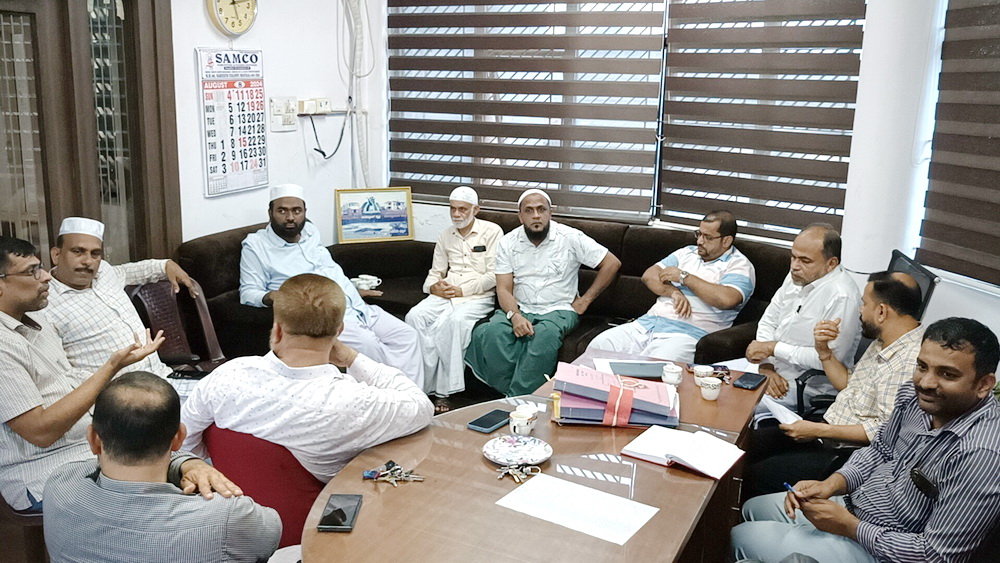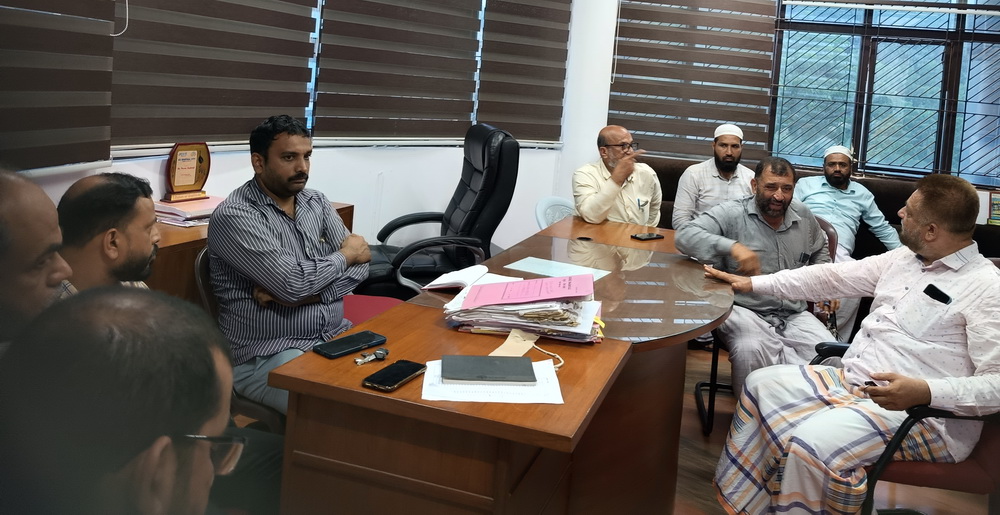
Bhatkal: A delegation from the Sarabi River Horata Samiti met with Bhatkal Municipal Chief Officer Neelkanth Mesta to express strong opposition to the ongoing failure of the wet well pumping station at Ghausia Street. This station, which pumps solid waste to the Sewage Treatment Plant (STP) in Venkatapur, approximately 5 kilometers away, has been discharging untreated sewage into the nearby Sarabi River.
The delegation warned that if the issue is not resolved within 30 days and the discharge of sewage into the river is not stopped, they will stage a protest outside the Assistant Commissioner's office with hundreds of people.
The delegation, led by Anjum Gangavali Nadvi, visited the Bhatkal Town Municipal Office on Wednesday. During the meeting, Municipal Chief Officer Neelkanth Mesta, along with Assistant Municipal Engineer Arvind and former Environmental Engineer Venkatesh Nauda, attempted to explain that the UGD plant in Bhatkal has not completely failed. However, due to population growth, the pressure from the motors installed to pump solid waste from the Ghausia street pumping station to the STP in Venkatapur has decreased, exacerbating the problem.

They informed the delegation that of the four motors installed, two are operational while the other two are on standby. A tender has recently been approved to install a new 80 HP motor, which is expected to be operational within two months. According to Engineer Arvind, running both the 80 HP and 50 HP motors simultaneously may not fully solve the problem but could help manage the situation to some extent.
Municipal Chief Officer Neelkanth Mesta suggested that the only long-term solution is to establish a mini Sewage Treatment Plant (Mini STP) in Ghausia Street. However, local residents have been reluctant to provide land for this project. In response, Imtiyaz Udaywar, speaking on behalf of the Horata Samiti, questioned why the Mini STP could not be established on the 8 acres of government land available near Ghausia Street. He insisted that if a Mini STP is the solution, it should be built on government land, and the issue should be resolved immediately. When the Chief Officer mentioned the need for approval from the Assistant Commissioner, some members of the delegation expressed their frustration, stating that obtaining such approval is the municipality’s responsibility. They demanded that the issue be resolved within a month and that the discharge of sewage into the Sarabi River be stopped.
In conclusion, the delegation gave the Chief Officer a one-month ultimatum, warning that if the 80 HP motor is not installed and other issues at the pumping station are not resolved, and if the discharge of sewage into the Sarabi River is not stopped by the end of September, they will stage a massive protest outside the Mini Vidhana Saudha.
Newly elected Municipal Vice President Altaf Kharuri, Standing Committee Chairman Qaisar Mohtisham, and Councillor Mohtisham Mande Abdul Azeem were present on the occasion. Mustafa Askiri, Taimoor Gawai, Naseef Khalifa, Abdul Sami Medical, Ashfaq K.M., Zulfiqar, Abdul Majid, and several other active members of the Sarabi River Horata Samiti also attended.
It should be recalled that the wet well of the pumping station at Bhatkal Ghausia Street, established in 2004-05, began facing issues just two years after its installation. The motors started malfunctioning, leading to the covert discharge of untreated sewage from the UGD (Underground Drainage) system into the Sarabi River.
By 2010, the situation had become severe and increasingly complex. The Sarabi River, once a clean water source, began turning into a polluted sewer. Additionally, the contamination spread to drinking water wells, damaging hundreds of them.
This environmental crisis also had a significant impact on the historical areas of Bhatkal, including Ghausia Street, Mushma Street, Khalifa Street, and Daranta. These locations, once renowned as the entry points for Arab caravans into Bhatkal via the Sarabi River from the Arabian Sea, gradually turned into a network of sewage drains. Despite numerous protests calling for the river's restoration, the protection of its clean water, and the relocation of the pumping station, the situation continued to deteriorate.
In response, just a few months ago, local sports centers from the affected areas established the Sarabi River Horata Samiti with the objective of saving the historical Sarabi River and relocating the UGD wet well pumping station. In its recent meeting, the Horata Samiti resolved to escalate the issue by referring it to the National Green Tribunal and proceeding based on the advice of legal experts.
